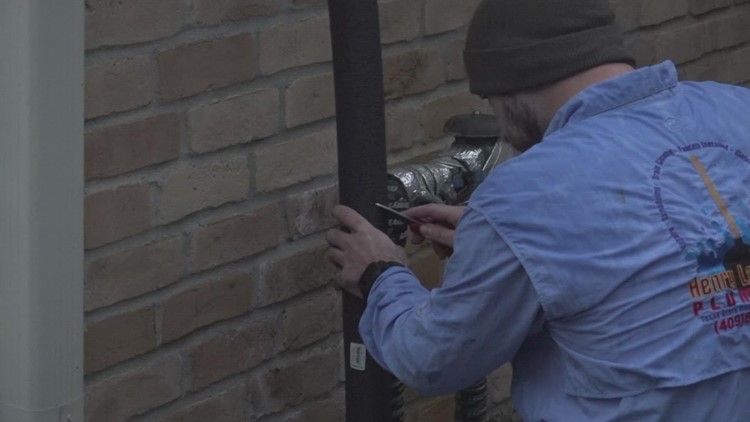HOUSTON — With freezing weather comes water and pipe issues. Even with preparation, pipes can freeze, but there are steps you can take to thaw them if they do.
If water is coming out of your faucets at just a trickle in freezing weather, there’s a good chance you have a frozen pipe.
First, shut the water off in case the pipes have cracked.
The American Red Cross says once you find where the line is frozen, apply heat to it by wrapping it in an electric heating pad, using a hair dryer or a space heater away from anything flammable.
They say to NOT use a blowtorch, kerosene or propane heater, charcoal stove or anything else with an open flame.
You should keep the faucet open. As water thaws, it’ll run through the frozen area and running water can help with melting. Richard Saad with Nick's Plumbing says it's best to keep faucets open -- both hot and cold -- in multiple bathrooms to keep the water moving throughout the home.
Keep applying heat until the water pressure is restored. If you can’t find the frozen area, can’t get to it, or just can’t get them thawed, you should call a plumbing company.
The most likely spot for frozen pipes is against the exterior walls or where water services enter your home, according to Saad.
You will also want to check all faucets or pipes. If one froze, others in your home may have.
Here's more guidance from the American Red Cross about pipes in freezing weather.
What if you suspect your pipes have cracked?
According to posts from the City of Pearland and Deer Park, if you suspect a crack in your pipes, make sure water is off. If you need help doing that, reach out to the city.
What to do if your pipes break
- Shut off your water at the main water valve.
- Electricity should be cut off to the area of the home with water.
- Call a plumber. It’s a good idea to research 24-hour plumbing companies in advance, just in case.
- If flooring, walls or ceilings are severely damaged, you may need to contact a water damage professional.
- You need to prevent mold and mildew buildup so use mops, towels and a wet/dry vacuum to soak up the water.



